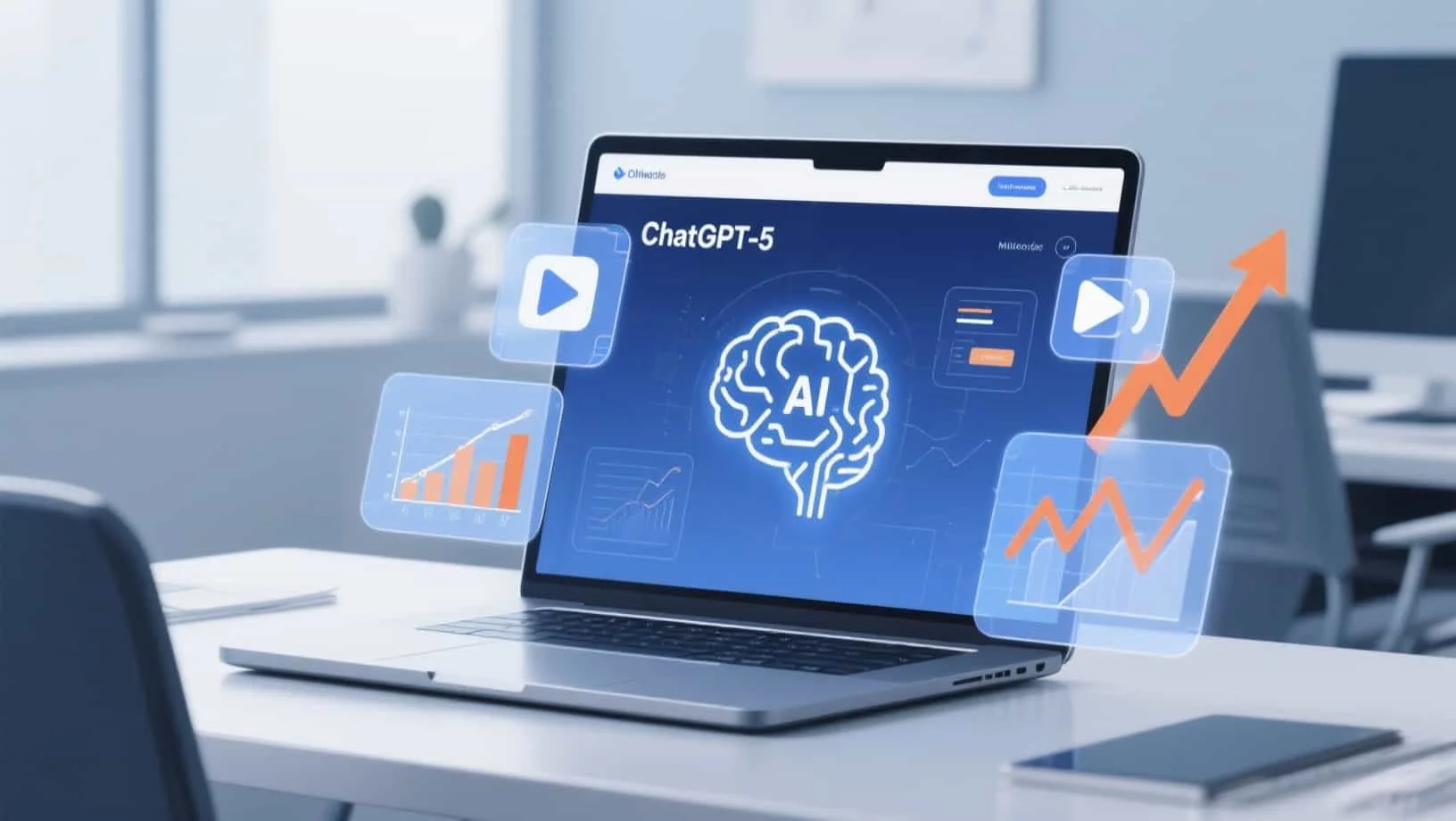The evolution from SEO to GEO: what changes for marketers?
The digital marketing landscape is undergoing a fundamental transformation. After more than two decades in which search engine optimization revolved around optimizing for traditional search engines, a new era is dawning. Generative Engine Optimization (GEO) is not just an AI trend – it is the future of online visibility and digital findability.
- Zero-click reality: 58.5% of Google searches end without a click, AI Overviews in 47% of queries
- Paradigm shift: From rankings to citations - GEO optimizes for AI-generated answers
- Authority crucial: 61% of AI signals come from editorial sources, external validation weighs heavier than self-content
- Conversational focus: 71% prefer voice search, optimization for natural language becomes essential
- Future strategy: "Search everywhere optimization" - visibility on all platforms where the target group is active
Why 2025 is the tipping point
The numbers don't lie. According to recent research by SparkToro, 58.5% of all Google searches now end without a single click to a website. AI Overviews now appear in almost 47% of all searches, while platforms like ChatGPT already register almost 5 billion visits per month.
This has a direct impact on traditional SEO strategies and conversion optimization. Zero-click searches are becoming increasingly dominant, as we discussed earlier in our article on the importance of zero-click searches.
"Google is no longer always the first place people go for answers. They're increasingly turning to social media, YouTube, Amazon, and ChatGPT," says Neil Patel, founder of NP Digital. This shift means that companies must fundamentally revise their strategy.
“Google is no longer always the first place people look for answers - they are increasingly turning to social media, YouTube, Amazon, and ChatGPT”
Source: Neil Patel Blog - Search Everywhere Optimization: The New SEO
From rankings to answers: the core of the transformation
Traditional SEO: the time of blue links
Classic search engine optimization revolved around a simple formula: identify keywords, optimize content, build backlinks, and hope for a high Google ranking. Success was measured by positions in Google's organic search results. The traditional model of "ten blue links" dominated the online search landscape for years.
GEO: the new reality of generated answers
Generative Engine Optimization completely changes this paradigm. Instead of directing users to websites, AI search engines like ChatGPT, Perplexity, and Google AI Overviews generate direct answers based on multiple sources. "From how keywords are targeted to how content is created and ranked, AI is changing the game's rules," according to research by Lumenalta.
“From how keywords are targeted to how content is created and ranked: AI is changing the rules of the game.”
Source: Lumenalta – Why generative AI will revolutionize SEO in 2025 and beyond
These AI-driven search engines use machine learning and natural language processing to generate contextual answers that often answer user questions without them visiting websites.
The impact on different types of businesses
Informative websites: from traffic to citations
Companies that traditionally relied on informative content are seeing drastic changes. Research shows that websites with guides or tutorials are experiencing a decrease in organic traffic of 15% to as much as 64%. The edtech company Chegg even saw its business model collapse when AI summaries drastically reduced their traffic.
This shift has direct consequences for e-commerce SEO and mobile optimization. Companies need to adapt their strategy to remain visible in AI-generated answers.
Local businesses: from maps to knowledge panels
For local SMEs, the dynamics are also changing. Local packs in Google now directly display business information, ratings, and contact details, which means users click less often to business websites. This makes local SEO more crucial than ever.
Why GEO is more than just a new SEO technique
Fundamental differences in approach
GEO requires a completely different mindset:
SEO focus: Ranking in search results GEO focus: Appearing in AI-generated answers
SEO success: Clicks to your website GEO success: Being cited as a source
SEO content: Optimized for keywords GEO content: Structured for AI understanding
The role of authority and trust
Research by Nine Peaks Media shows that 61% of the signals that determine AI's understanding of brand reputation come from editorial media sources. This means that external validation now weighs more heavily than self-published content.
The new rules of the game for 2025
1. From keywords to entities
AI systems understand concepts via entities, not individual keywords. According to Neil Patel's research, companies should structure their content with "clear, concise answers that AI can reference".
“AI is completely changing the rules of SEO - from how keywords are targeted to how content is created and ranked”
Source: Lumenalta - Harnessing GenAI for Optimal Search Visibility
This requires a different approach to keyword research and structured data implementation, as we discussed extensively in our guide on combining AI and SEO.
2. The rise of conversational search
With 71% of consumers preferring voice search over text, natural language is becoming crucial. Voice search optimization is no longer an option, but a necessity for modern companies.
3. Multimodal optimization
Platforms like Google Lens are making visual searches increasingly popular, which means companies also need to optimize their images and videos for AI recognition. This aligns with our expertise in AI content creation.
The psychology behind the shift
User behavior in transition
We are now in the "Early Majority" phase of AI adoption, with ChatGPT already a household name. Users are experimenting with new AI tools and conversational search, but still rely on traditional search engines for the majority of their information searches.
This hybrid search behavior creates new opportunities for companies that adapt their digital marketing strategy to both traditional and AI-driven search engines.
Trust in AI content
Despite risks of AI hallucinations, 73% of users trust AI-generated content. This paradox shows why responsible AI implementation with human oversight is essential.
Practical consequences for SMEs
Traffic vs. visibility
The focus is shifting from website visits to brand awareness and online authority. As BJ Cook from 85SIXTY states: "Strategies need to adapt to the growing influence of AI-generated search overviews." Companies need to develop new KPIs that go beyond traditional clickthrough statistics.
“Generative Engine Optimization is not a technical upgrade - it's a fundamental shift in how information is delivered and consumed”
Source: Intero Digital - The Rise of Generative Engine Optimization
This means that SEO professionals need to adapt their approach from traffic generation to brand awareness and thought leadership in their sector.
Adjusting content strategies
Neil Patel's experiments at NP Digital show that content written by people still performs better than AI-generated content. The trick is to combine human creativity with AI efficiency.
This is exactly where our AI audit for SMEs comes in. We help companies understand how AI can strengthen their content without losing the human factor.
The future of search
Fragmented search landscapes
Patel predicts that we are moving towards "search everywhere optimization" where brands must optimize their organic presence on every platform. This means that SEO must expand to social media, YouTube, Amazon, and AI chatbots.
For SMEs, this means an expansion from traditional performance marketing to LinkedIn marketing and other platforms.
Technological developments
Google's Search Generative Experience (SGE) combines traditional search results with AI-generated answers, representing a significant shift towards a more user-friendly and interactive search engine.
This has a direct impact on Google Ads optimization and online advertising strategies.
What this means for your company
Direct actions for 2025
Audit your current AI visibility - Test whether your brand appears in ChatGPT, Perplexity, and Google AI Overviews. Consider a professional AI audit to evaluate your current status.
Restructure your content - Make information easily processable for AI systems through better prompt engineering and content optimization.
Invest in authority - Ensure external mentions in reliable sources, as described in our guide on digital marketing expertise.
Develop multimodal content - Combine text, video, and audio for maximum visibility, supported by AI automation.
Long-term strategy
As experts from The VC Corner state: "AI isn't just finding answers anymore. It's understanding context, catching errors, and filtering out low-quality content". This means that quality and authenticity are becoming more important than ever.
This is particularly relevant for e-commerce companies. Our expertise in Shopify optimization and conversion optimization helps companies make this transition successfully.
The role of human expertise
Why AI cannot replace SEO
Generative AI can improve SEO, but not replace it. "Think of it as your personal assistant that helps out with repetitive tasks," according to MarketingProfs. The combination of AI efficiency with human strategy and creativity remains the winning formula.
"AI isn't here to ruin SEO altogether; it can actually enhance it. Think of it as your personal assistant that helps out with repetitive tasks like generating local schema or identifying keyword clusters." Danny Shepherd, Intero Digital
Finding balance
Mike Barkemeyer of Lumenalta warns: "make sure you don't lose your brand's unique voice in the process". The goal is to harness AI's analytical power while maintaining your brand personality.
Conclusion: evolution, not revolution
The transition from SEO to GEO is not an abrupt break, but a natural evolution. As Cariad Marketing states: "GEO isn't just a technical upgrade—it's a fundamental shift in how information is delivered and consumed online".
Companies that embrace this shift now are positioning themselves for success in an AI-driven future. It's not about abandoning traditional SEO, but about expanding it to new platforms and technologies.
Neil Patel sums it up perfectly: "In 2025, it's less about search engine optimization and more about search everywhere optimization". The future belongs to companies that optimize their visibility for both people and machines, on all platforms where their target audience is active.
At ClickForest, we help SMEs navigate this transformation. From traditional SEO services to cutting-edge AI solutions – we ensure your brand remains visible in the search results of tomorrow. Discover how our online marketing expertise can help your business grow in the AI era.

🚀 More leads, higher conversion, better ROI
This article gave you insights. Now it's time for action. Whether you want to build a profitable webshop, get more revenue from performance marketing or SEO, or grow with AI marketing - we'll help you make concrete progress.
💬 Discuss your challenge directly with Frederiek: Schedule a free strategy session or send us a message
📧 Prefer email? Send your question to frederiek@clickforest.com or call +32 473 84 66 27
Strategy without action remains theory. Let's take your next step together.
Frequently asked questions about the evolution from SEO to GEO
-
SEO (Search Engine Optimization) focuses on optimizing content for traditional search engines such as Google. GEO (Generative Engine Optimization) focuses on optimizing for AI-driven answers and generative search engines such as ChatGPT, Perplexity, and Google AI Overviews.
-
No, GEO does not replace SEO but complements it. Traditional SEO remains important for visibility in Google's organic results, while GEO ensures presence in AI-generated answers.
-
GEO success is measured by citations in AI answers, brand awareness in AI platforms, and the quality of visitors who come via AI referrals. Traditional metrics such as traffic and rankings remain relevant but are no longer the only measure.
-
Informative websites, blogs, news sites, and educational platforms experience the greatest impact because AI systems often summarize their content without providing referrals. Local businesses are also seeing changes due to AI-driven local search results.
-
Start by testing your current AI visibility by asking questions to ChatGPT, Perplexity, and Google AI Overviews. Then, restructure your content for AI understanding and focus on building external authority.
-
Structured data (schema markup) helps AI systems better understand and process your content. FAQ schema, Organization markup, and Product structured data increase the chance of citations in AI answers.
-
Voice search drives the demand for conversational content and natural language. AI systems are better at understanding spoken questions, which means content must be optimized for how people actually speak.
-
Yes, small businesses often have an advantage in GEO because AI systems look for specific expertise and niche knowledge. Local authority and specialized knowledge can weigh more heavily than domain authority.
-
Backlinks remain important, but the emphasis is shifting to brand mentions and citations in reliable sources. AI systems are increasingly assessing authority based on external validation rather than traditional link metrics.
-
AI technologies evolve rapidly, so GEO strategies should be evaluated every 3-6 months. Keep an eye on new AI platforms and regularly test your visibility in different AI systems.
Sources and references
Research and statistics:
SparkToro: "Zero-click searches now account for 58.5% of all Google searches" - https://sparktoro.com/blog/
Nine Peaks Media: "61% of signals that shape AI's understanding of brand reputation come from editorial media sources" - https://ninepeaks.io/whats-the-impact-of-ai-on-seo-in-2025
Botify: "AI overviews appear in up to 47% of every search query" - https://www.botify.com/
Expert statements:
Neil Patel (NP Digital): "Google is no longer always the first place people go for answers" - https://neilpatel.com/blog/search-everywhere-optimization/
BJ Cook (85SIXTY): "Strategies need to adapt to the growing influence of AI-generated search overviews" - https://www.designrush.com/agency/search-engine-optimization/trends/zero-click-searches
Mike Barkemeyer (Lumenalta): "Make sure you don't lose your brand's unique voice in the process" - https://lumenalta.com/insights/harnessing-genAI-for-optimal-search-visibility
Technical developments:
Salesforce: "AI-powered content generation tools can quickly generate topic ideas based on target keywords" - https://www.salesforce.com/marketing/ai/seo-guide/
Cariad Marketing: "GEO isn't just a technical upgrade—it's a fundamental shift in how information is delivered" - https://cariadmarketing.com/insights/ai-and-seo-the-future-is-now/
ResearchFDI: "Google's Search Generative Experience represents a significant shift towards more user-friendly search" - https://researchfdi.com/future-of-seo-ai/











